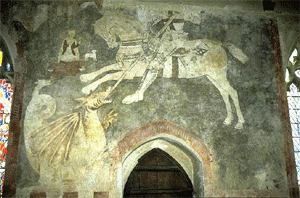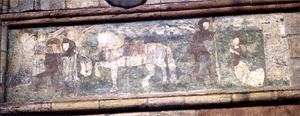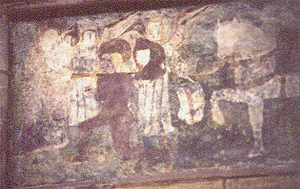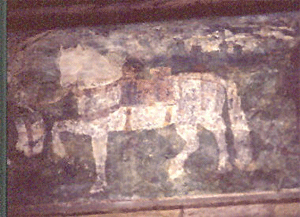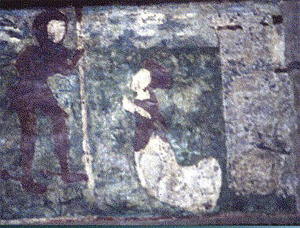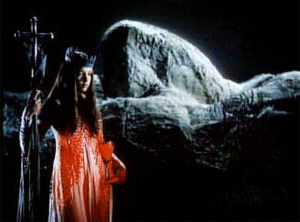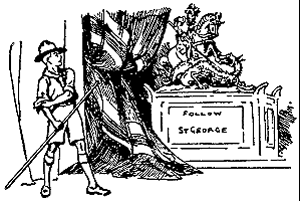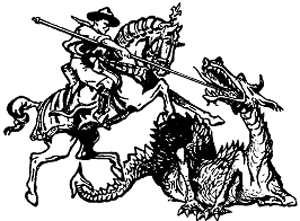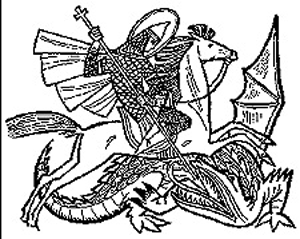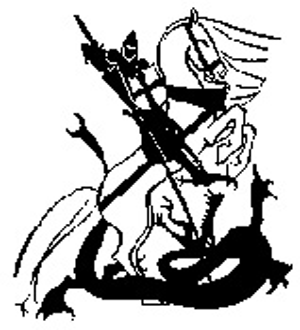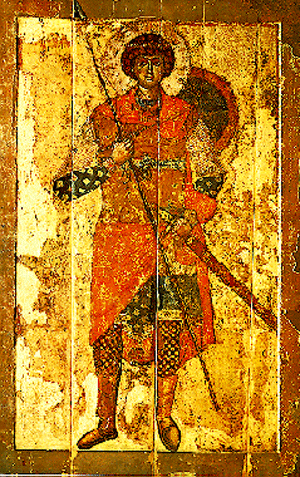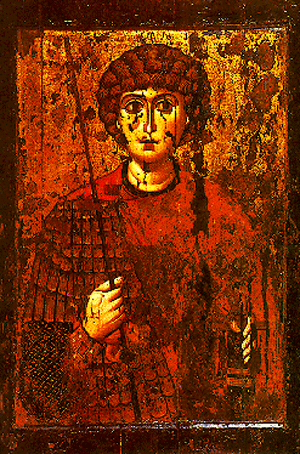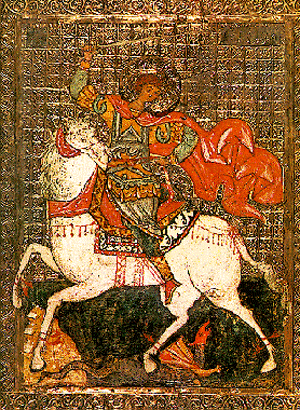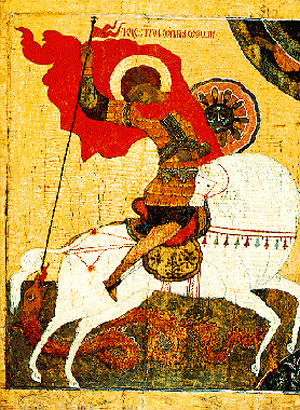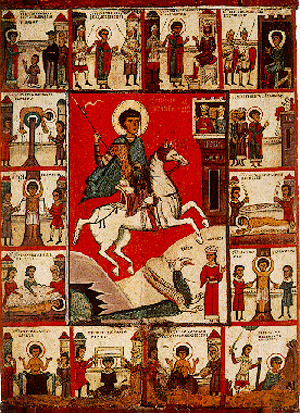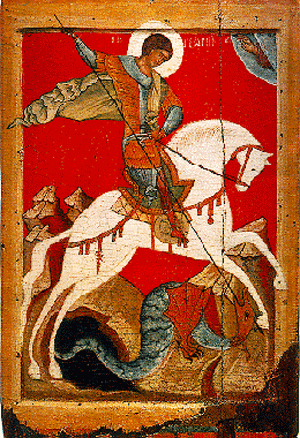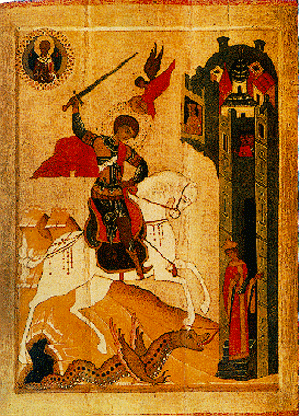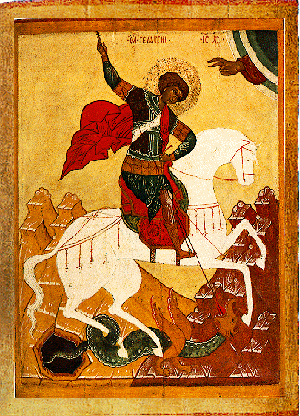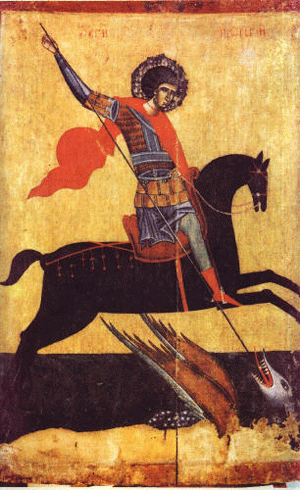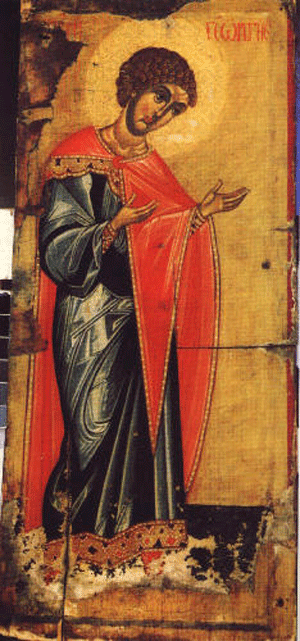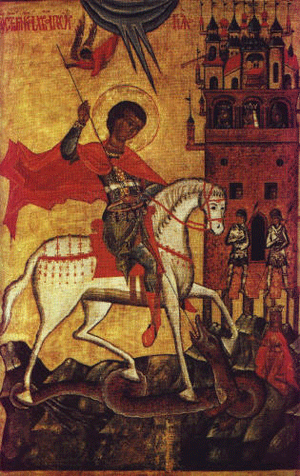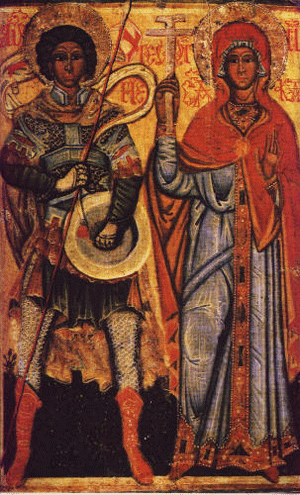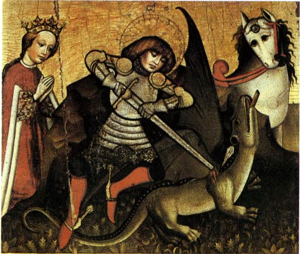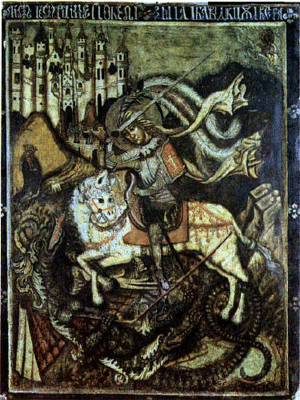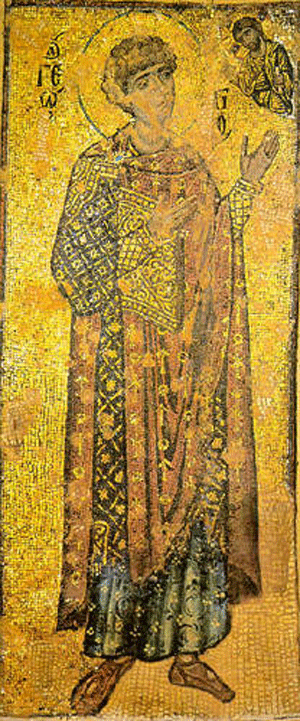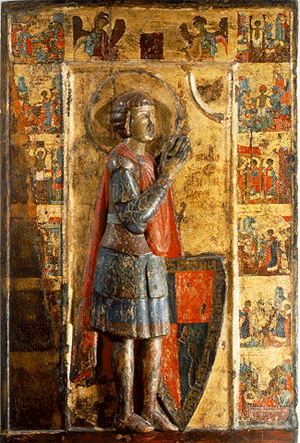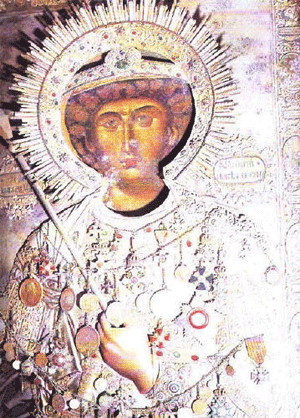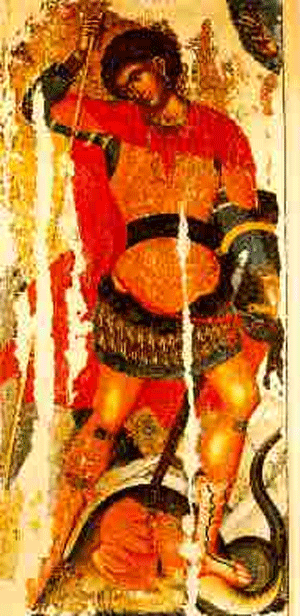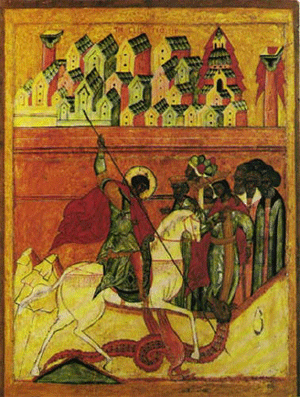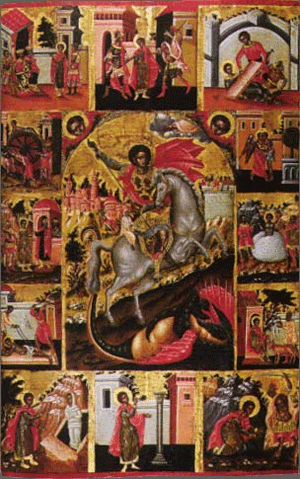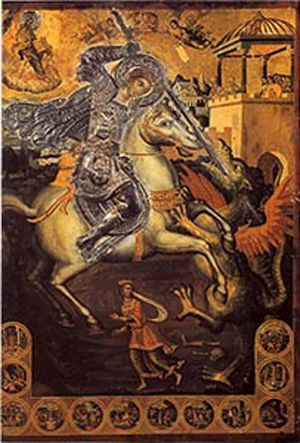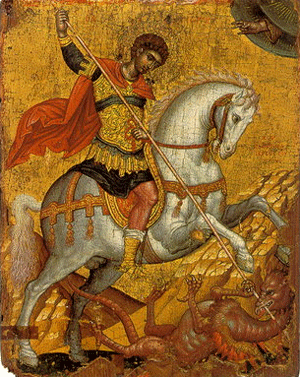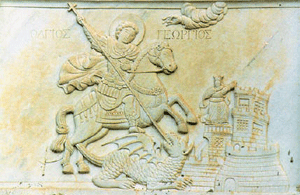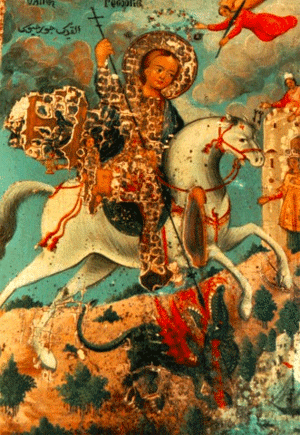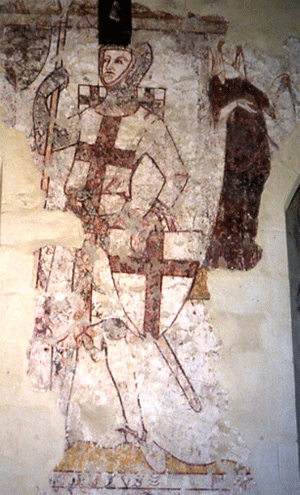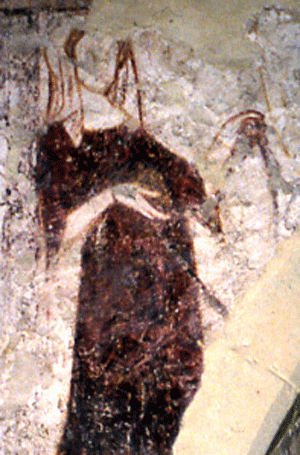The Passion of St. George (Part 1)(Translation From E.A.W. Budge (1888), 203-35)
by David Woods
NOTICE: THIS WORK MAY BE PROTECTED BY COPYRIGHTYOU ARE REQUIRED TO READ
THE COPYRIGHT NOTICE AT THIS LINK BEFORE YOU READ THE FOLLOWING WORK, THAT IS AVAILABLE SOLELY FOR PRIVATE STUDY, SCHOLARSHIP OR RESEARCH PURSUANT TO 17 U.S.C. SECTION 107 AND 108. IN THE EVENT THAT THE LIBRARY DETERMINES THAT UNLAWFUL COPYING OF THIS WORK HAS OCCURRED, THE LIBRARY HAS THE RIGHT TO BLOCK THE I.P. ADDRESS AT WHICH THE UNLAWFUL COPYING APPEARED TO HAVE OCCURRED. THANK YOU FOR RESPECTING THE RIGHTS OF COPYRIGHT OWNERS.
The Martyrdom of Saint George, the valiant martyr of our Lord Jesus Christ, who completed his strife on the 23rd of the month Pharmuthi, in the peace of God, Amen.Now in times of old there arose a severe and terrible storm, and a great and mighty storm and persecution came upon the church. In all places the governors had gone astray, and they dragged the preachers of the truth to the altars of the idols, and compelled them all to offer sacrifices to the devilish idols. Thus also did the governor Dadianus, who had acquired dominion and had obtained the rule over the four quarters of the earth. When Dadianus had become chief, he sat upon the tribune, and wrote edicts to be proclaimed throughout the whole world; and these are the things that were written in them. "Inasmuch [p. 204] as a rumour has come to my ears that He to whom Mary gave birth is the God who is alone to be worshipped, and that Apollo and Poseidon and Hermes and Astarte and Zeus and Ezabel (sic) and Uranus and Scamandros and the other gods are not to be worshipped at all, but that Jesus Christ whom the Jews slew is to be worshipped, - I, therefore, write to every place, and to the governors of every land, and to all rulers under the authority of my government to come to me speedily that they may know the decision of my power." Then seventy governors from all parts of the world were gathered together there with so great and mighty a multitude, that the land could not contain them for their number. And Dadianus the governor sat upon the tribune and made them bring forth all the instruments of the torture chamber and lay them before him; and these were they. The brazen bed, the bone smashing choppers, the iron rods (?), the wheels with knives fixed to them, the wooden horses, the wooden [p. 205] gloves, the iron gloves, the tongue slitting knives, the tools for drawing out the teeth, the iron bone borers, the sharp saws, and other implements of cruel torture. And Dadianus swore an oath, saying, "If I find any people of doubtful mind and refusing to worship the gods, I will reverse the commands of my fathers and will torture them with bitter sufferings, I will break in the towers of their hearts, I will smash their heads, I will cut out their brains with sharp knives, I will saw off their shin bones, I will tear open their bodies, and I will cut off their limbs from their bodies." When the multitude heard these things they feared the tortures greatly, and those who wished to become martyrs [refrained] when they considered the numbers of tortures which they ran the risk of suffering; and three whole years went by without anyone daring to say, "I am a Christian."
Now there was a young man whose name was George, the sun of truth and the glorious star betwixt heaven and earth; he was a tribune in the imperial army, and came from Cappadocia. And when he had served his time as tribune and acquired much wealth, he came to the governor Dadianus and wished to be made a count by him. When Saint George had come to the city and saw the frenzied idolatry of the governors and that they had forsaken God, he straightway decided to give up his rank of tribune, saying, "I will become a soldier of my Lord Jesus Christ the King of heaven." And when he had distributed all his wealth and given what he had to the poor, he rushed into the presence of the governors and cried out, saying, "Cease your frenzy, O governors, and proclaim not to be gods the things which are not gods; let the gods who have not made heaven and earth perish ! As for me, I will worship one God, the [p. 206] Father of our Lord Jesus Christ and the Holy Spirit." The dragon looked at him, and said, "Every person who has gone forth from the benevolent guidance of the gods perishes, and as for us, we worship things which are beneath the heavens, for the gods Fire and Sun appear to us as mighty beings; know now that thou hast not only despised us, but thou hast also despised the righteous gods. Offer sacrifice then to the gods and to Apollo who is the saviour of the whole world, and be convinced that the gods who thou humblest know those who honour and obey them, and know how to punish those who disobey them. And now, tell me from whence thou comest ? what is thy name ? and for what purpose hast thou come hither ?" Saint George answered, and said, "The chief name which I bear is Christian, I am by birth a Cappadocian, I was a soldier in a famous company, and I performed my duties of tribune satisfactorily in Palestine where it served. Who are the gods whom thou wouldst force me to worship, O king ?" The governor said to him, "I desire thee to worship Apollo who hung out the heavens, and Poseidon who made fast the earth." Saint George answered and said, "Neither for thy sake, O evil dragon, nor for that of the governors thy companions will I speak about the righteous ones and thy dead god, but for the sake of these multitudes here present. Whom wouldst thou compel me to worship, O king ? Peter the chosen one of the Apostles, or Apollo who corrupts the whole world ? To which of these would thou have me offer sacrifice ? to Elijah the Tishbite who was an angel upon earth and who walked upon earth and was taken up to the gates of heaven, or to Scamandros the sorcerer who worked enchantments by fire and who led many people astray, who com-[p. 207] mitted adultery with Timetia (Demeter ?), who begat Saar and Sarphat the ophani of the warrior of the city of Pontus, whose deeds were evil and who were cast into the abyss of the sea ? Tell me, O king, to which of these wouldst thou give judgement ? to Samuel who prayed to God, or to Poseidon the destroyer of the ships of the sea ? to Antaeus and Herakles, or to those of the Martyrs and Prophets who wear crowns ? Tell me, O king, to which of these wouldst thou give judgement ? to Jezebel the slayer of the prophets or to Mary the Virgin the mother of my Lord Jesus Christ ? Be ashamed, O king, for the things which thou worshippest are not gods, but deaf idols."
When Saint George had said these things, the governor was greatly enraged and commanded them to hang him upon the wooden horse, and to torture him until his bowels flowed out upon the ground. After these things four quaternions of soldiers [p. 208] laid him out and beat him with leather whips until the flesh of his body was torn in shreds; and they sprinkled salt upon him. And they brought hair sacks with which to excoriate his body until his blood ran like water; but he was patient under these sufferings.
And it came to pass that during that night the Lord appeared to Saint George, and said to him, "Be strong and of good cheer, beloved George, for I will strengthen thee to bear all these sufferings which they have brought upon thee. And I swear by Myself, and by the holy angels, that among those born of women no one has arisen greater than John the Baptist, and that after thee there shall arise none like unto thee; for behold, I have made thee lord over these seventy governors, and whatsoever thou sayest shall happen unto them. Thou shalt die three times, and I will raise thee up again, but after the fourth time, I Myself will come upon a cloud, and will take thee away to [p. 209] the place of safe keeping which I have prepared for thee for thy holy dwelling; be strong and fear not, for I am with thee." And when He had embraced him He went up to heaven with His holy angels in great glory.
When it was morning the governor commanded, and they brought him before the tribune. Now Saint George was singing a Psalm, saying, "O God, hasten thou to my help, hasten thou to my defence." When he had come to the tribune, he cried out, saying, "O tribune, I and my Lord Jesus Christ have come to thee and thy stone Apollo." And they laid hold of him and tied him with four leather straps, and beat him with leather whips upon his back and belly; and they cast him back again into prison. And Dadianus the governor wrote a letter in which he thus said, "I write to the whole world, greeting. Let any enchanter or magician who can put an end to the magic of this Christian come hither to me, and I will give him much wealth and any territory that he shall ask for, and he shall be second in the kingdom." When this letter had been sent throughout the whole world, behold a man appeared whose name was Athanasius, and he came to the governor and said, "O king, live for ever ! There is nothing which I am not able to perform in thy presence." The governor rejoiced, and said, "What sign wilt thou work before me that I may know that thou art able to put an end to the magic of the Christians ?" Athanasius answered and said, "Let them bring me an ox." And when they had brought him he spake some words in his ears, and he was rent in twain. Athanasius said to Dadianus, "Let them bring me a pair of scales," and they brought them to him; and he threw the one half of the ox into one pan of the scales and the other half into the other, and they were exactly equal, and there was not the least difference between the weight of the two halves. And the governor commanded and they brought Saint George to the tribune, and he said to him, "O George, it is for thy sake that I have summoned this man into my domi-[p. 210] nions; thou must vanquish his magic or he will vanquish thine, thou must slay him or he will slay thee." Saint George looked at the magician and said, "Hasten, my brother, and do unto me speedily whatsoever thou wishest to do, for I see grace drawing nigh unto thee." And straightway Athanasius took a cup, and washed his face in it, and invoked the names of demons over the cup, and gave it to him to drink; and when he had drunk no evil happened to him at all. Athanasius answered and said to George, "My Lord, let me only give thee one other sign, and if no evil befall thee then I will believe upon Him Whom they crucified." Then he took another cup, and washed his face in it, and invoked the names of demons more evil than the first over it, and he gave him the cup to drink; and when the saint had drunk no evil happened to him. When Athanasius saw that no evil had happened to him, he said to him, "O Saint George, thou hast the cross of Jesus Christ the Son of God, who came into the world to save sinners; have mercy upon my soul, and give me the seal of Christ." When Dadianus saw what had happened he was greatly enraged, and commanded them to take the magician outside the city and to slay him with the sword; so he consummated his martyrdom, and was esteemed worthy of everlasting life. And the governor commanded them to throw Saint George into prison until he had decided what he should do with him.
[p. 211] When it was morning the governor commanded a huge wheel to be made with sharp nails and stakes fastened in it; and the wheel was made after the manner in which he commanded it to be made: the upper part of it was like the edge of a knife, and the lower part like a sharp two-edged sword. And the governor commanded them to bring Saint George out of prison and to throw him upon the instrument of torture. When Saint George turned and saw the shape of the cutting part of the machine, that the upper part of it was like the edge of a knife and the lower part a two-edged sword, he said within himself, "Verily, I shall never come forth alive from this instrument." But again, afterwards, he said within himself, "Woe to thee, O George, why hast thou allowed this thought to enter thy heart ? Consider the lot which has come to thee, and remember that the Jews crucified the Lord Himself." And after this he lifted up his eyes to heaven, and said, "O Lord, the unchangeable God, the Ruler of eternity, to Whom belongeth victory, Thou Who givest grace to the martyrs, Whose glory and crown Thou art; Thou who, before Thou hadst created anything, yea, before Thou hadst created the heavens and the earth, didst rest upon the waters, and now Thou restest upon the whole race of man, and knowest Thou place of rest; Who hast spread out the heavens like a chamber, and at Whose command the clouds pour out rain in their season; Who rainest upon the just and the unjust; Who hast weighed the mountains in a balance and the hills in a pair of scales; Who bringest the wind out of Thy store houses; Who hast cast the rebellious angels into the abyss of hell, where they are punished by evil dragons, and fettered and chained with indissoluble bonds; O Thou the least of Whose commands it is impossible to alter; O Lord God Who, in the last days, didst [p. 212] send into the world Thy only begotten Son, Who took upon Himself flesh by the Virgin Mary, and became man, without anyone being able to understand how to find out the manhood of Him, the Lord Jesus Christ, begotten of Thee in very truth; Who did walk upon the face of the sea as upon dry land; Who did feed five thousand men with five loaves of bread, and they were satisfied; Who did rebuke the waves of the sea and their crests were bowed down; come now, O my Lord, come Jesus, and help my infirmity, for I am a sinner; let these sufferings be light upon me, for Thine is the glory, and Thy name is full of glory for ever, Amen."
When he had finished [his prayer and had said] "Amen", they threw him on the wheel, and set it to work; and immediately his body was broken into ten pieces. Then straightway Dadianus lifted up his voice, saying, "Be strong and know, O ye governors, that there is no god save Apollo and Hermes and Zeus and Athene and Scamandros and Hephaistos and Herakles and Poseidon, who work good on the three parts of the sea, and from whose hands kings receive power. Where is now the God of Saint George Whom they call "Jesus", Whom the Jews crucified and slew ? why has He not come and delivered him out of my hands ?" And the dragon of the abyss commanded them to throw his bones outside the city into a dry pit, saying within himself, "Lest the Christians find a bone of his, and build a martyrium over it, and bring up his blood against us."
Now it was the hour for eating, and the governor, together with the sixty-nine governors who were with him, went to eat. And while they were eating there came a great earthquake, and suddenly the sky became overcast with clouds, and there was so great a trembling that mountains split asunder suddenly, the earth shook, and the sea was lashed into billows, and the [p. 213] waves thereof rose to the height of fifteen cubits. And Michael blew with his trumpet, and behold the Lord Jesus came upon His chariot of the Cherubim, and stood on the edge of the pit. And he said to the archangel Michael, "Go down into the pit, and gather together the bones of my son George, for this valiant George thought in his heart, "I shall not escape from this instrument (into which I had allowed him to fall) this time"; that he may believe with all his heart, and know that I alone am able to deliver him." And Michael went down into the pit, and put together the holy body of Saint George: and the Lord took hold of his hand, saying, "O George my beloved, behold, the hand which formed Adam the first man is now about to create thee anew"; and the Lord breathed upon his face and filled him again with life, and He embraced him, and went up to heaven with His holy angels. And Saint George arose in haste from the dead, and went through the squares of the city looking for the governors, and he found them afterwards sitting in judgement. Then he ran into their presence, and said to them, "Do ye not know who I am ?" Dadianus the governor lifted his eyes guiltily, and said to the Saint, Who are thou then ?" The martyr of Christ replied, "I am George whom ye slew yesterday, because ye despiseed my God who could destroy you in a moment." Dadianus continued looking into the face of the Saint, and said to him, "Thou art not he, but his shade", and one said to him, "Perhaps it is some one like him". And Anatolius the general knew him, and said, "Of a truth this is George who has risen from the dead"; and he believed with all his company. Now the number of those [of the army] who believed upon Christ was three thousand and nine and one woman from the multitude. And Dadianus the governor commanded them all to be cast forth outside the city in a desert place, and to be divided into four divisions and to be slain. Thus they consummated their martyrdom at the ninth [p. 214] hour of the Sabbath day on the fifteenth day of Phamenoth, and went to Paradise in glory, and received pardon for their sins.
Then the governor commanded them to bring Saint George to the tribune; and he commanded them to bring an iron bed to which they might bind the righteous man. Then he made them melt lead until it was liquid, and bring a vessel in the shape of an iron ladle and thrust it [full of lead] into his mouth. Then they drove sixty nails through his head into the bed. And Dadianus made them bring a great stone chiselled out to fit his head, and they thrust his head in it, and made it fast with lead, and they rolled him down with the stone [from a high place] and severed his bones one from another; but he bore these tortures with fortitude. Then Dadianus commanded them to remove the stone from him, and to hang him up head downwards, and to tie a large stone to him, and to light a huge fire under him.
After these things the governor commanded to throw him into a bronze "bull" and to drive sharp nails into it: then he commanded them to bring a machine to revolve inside the "bull", that the body of the saint might be broken to pieces by the nails and his limbs become like the particles of dry summer dust; and Saint George bore all these things with fortitude. Then Dadianus commanded them to cast him into prison and to fasten him to the woodwork until he had decided what to do with him or how he should destroy him; now he was very handsome [p. 215] in appearance. And in that night the Lord appeared to him, saying, "Be patient, O George My chosen one, be of good cheer and be not dismayed, for I am with thee, and there shall be great joy in heaven for thy sake and for the sake of thy contest. Behold, thou hast died once and I raised thee up; thou shalt yet die twice and I will raise thee up again. But the fourth time I Myself will come in the clouds, and I will bring thee to the place of safety which I have prepared for thy body. It is I who give strength to thy holy body, and I will make thee to lie down with Abraham and Isaac and Jacob; be not sad of heart for I am with thee. Thy martyrdom shall be consummated before these seventy governors, and thou shalt testify of Me before them. And they will torture thee for seven years for My name's sake, but be not sad of heart, but of good cheer." And the Lord saluted him, and went up to heaven with His holy angels, and the valiant martyr of Christ looked after Him, and continued looking until the day rose; and he rejoiced in the encouragement which the Lord had given him.
When it was morning, the governor commanded them to bring Saint George to the tribune. When they had brought him, one of the seventy governors, whose name was Magnentius, said to him, "O George, I seek a sign at thy hands, and if thou do it before me, by our lord the Sun, and by the seventy gods, and by Artemis the saviour of the whole world, I will believe on thy God, and will worship Him nobly." Saint [p. 216] George said to him, "Say what thou wilt ask of me." Magnentius the governor said to him, "Behold there are seventy thrones here, a throne for each of us, and the legs of them are made of various kinds of wood, some fruit-bearing and some not. Now, if thou wilt make manifest that each wooden leg takes root and blossoms through thy prayer; and that each one made of the wood of a fruit-bearing tree gives fruit; and that each one made of the wood of a tree which does not bear fruit puts forth leaves [only]; by this I will believe on thy God." Then Saint George threw himself upon his face and prayed to God a long time, and sighed. And it came to pass that when he had finished his prayer and said "Amen", and was rising up, there was a great trembling and shaking, for the Spirit of God came upon the thrones, and they budded and the legs put forth roots and blossomed: those that were of fruit-bearing trees put forth fruit, and those that were not put forth leaves only. Then Magnentius the governor said to him, "A great god is Herakles who thus manifests his power in dry wood." Saint George answered and said, "Wilt thou compare this blind and dumb idol Herakles with the God who made the heavens and the earth, who made to exist that which did not exist and who can destroy thee with him speddily ?" Dadianus the governor answered and said to Saint George, "O excellent Galilean, I know how I will destroy thee." Then he commanded them to bring a huge saw, and they sawed him in two, and so he yielded up his spirit. And he commanded a large cauldron to be brought [p. 217] and to throw the two parts of the body of the holy man into it, together with lead, and pitch, and animal fat, and bitumen; and they heated them together until they melted, and the flames went up to a great height, and that which was melted flowed hither and thither by reason of the intensity of the flames which rose to a height of fifteen cubits. And they brought pieces from the cauldron to the king, saying, "This (wretched man) has come to an end and is burnt up." And Dadianus commanded them to bury the cauldron and the pieces of the saint which were in it in the earth, lest the Christians should find his remains and build a martyrium over them. When the attendants had finished burying the righteous man and were going away, there was a great trembling in the air and the earth shook to its foundations: and behold the Lord Jesus Christ came down from heaven with His holy angels, and stood over the place wherein the cauldron was buried. And He said to Zalathiel the angel, "Bring up hither the cauldron", and when he had brought it up he laid it down upon the ground. And the Lord, in Whom is might, answered [and said], "O George, my chosen one, arise ! For I am He that raised up Lazarus from the dead, and I now command thee to arise and come forth from the cauldron and stand upon thy feet; I am the Lord thy God." And straightway the nobly valiant man rose up in great power as one who had suffered no pain at all; and every one who saw him marvelled. The Lord said to him, "Be strong and of good cheer, George, my beloved, for there shall be a great joy to thee in heaven and upon earth, and before My Good Father, and before My angels on account of thy contest; be strong, for I am with thee." And He went up to heaven with his holy angels.
[p. 218]And Saint George arose and walked, and sent to the governor, saying, "Behold, I am going about the city, teaching." And the governor straightway commanded them to seize him and to bring him to him to the tribune; and as he was coming he cried out, saying, "O tribune, O tribune, I and my Lord Jesus Christ, the Son of the living God come to thee and thy Apollo."
And behold, a woman whose name was Schollastike cried out to Saint George the martyr of Christ, saying, "O my lord George, my son was yoking his ox in the field, and the ox fell down and died. O my lord, help my poverty, for I know that my lord is able to do so through God." The saint said to her, "Take this staff from my hands, and go to the field and lay it upon the dead ox, and say, "Thus saith Saint George in the name of Jesus Christ, Arise and stand up";" and the woman did as he had told her, and the ox arose straightway. And the woman glorified God, saying, "Blessed is the hour in which thou didst come into this city, verily thou art a prophet and God hath visited His people."
And again Dadianus sent after the martyr. When he had come, Trakiali the governor spake to him, saying, "Concerning the dry wood which budded, we know not of a certainty whether it was thy God who made it bud, or our god. Now behold we have here a sepulchre cut in the rock on the road to the cemetery, and no man knoweth where it is, nor where the opening of it is: but if through thy prayers the bones of those [p. 219] who are buried therin rise, I swear by my lord the Sun, and by the Moon and by Artemis the mother of the gods, that I will believe upon thy God and become a Christian." The blessed George answered and said, "There come to me the words which I have heard in the Gospel, saying, If ye have faith like a grain of mustard seed ye shall say this to the mountain, Depart hence, [and it shall depart], and there shall be nothing impossible to you. But now arise, thou and Dadianus and the governors of Egypt, and open the door of the tomb and bring hither to me the rotten bones of those who are dead, together with their dust." Then the three governors went straightway to the place of the sepulchre and opened the door, but they found no bones at all of the dead; and they took up the bone dust which they found, and brought it to Saint George: and Saint George threw himself down upon his knees, and prayed for the space of an hour. When he had finished his prayer and said, "Amen", there was a mighty trembling, and flashes of lightning shone upon those bones. And there came forth immediately from them five men and nine women and three little children; and when the governors saw what had taken place, they marvelled. Then the governors cried out to one of those who had risen from the dead, and said to him, "What is thy name ?" And he that had risen from the dead answered and said, "My name is Boes." Dadianus said to him, "How many years is it since thou didst die ?", and he replied, "More than two hundred years." Dadianus said to him, "Had Christ come into the world at that time, or not ?", and he that had risen from the dead said, "I do not know, nor [p. 220] did I ever hear that He had come." Dadianus said to him, "On what god dost thou believe ?", and he that had risen from the dead said to him, "Do not force me, O governor, for I am ashamed to say what god I believed on. I believed on a god whom they called Apollo, a stupid, dumb, deaf and blind [idol]. When I left the evil living of this life, I went to live in a place in the river of fire, until I should go where the worm dieth not. Hast thou never heard of the Scriptures of the Christians which say, "Remember me in the day of terror in the place where there is no help, but disquiet and fear." There is no mercy there, neither can the judge be persuaded; but the work which every man hath done shall be laid before His eyes. Then the Judge will answer and say, "Show me each one his work that I may give him his wages, according to that which he hath done;" hear then, O king, and I will tell thee. Every man who lives on earth, and confesses Him whom they crucified, if he bears many sins in his body when he departs from this wicked world, will live in fetters on account of his sins, but on the Lord's day he will have rest because the Lord Jesus looks upon those who are punished on the Lord's day; but as for me, there is no rest at all given to me on the Lord's day because I did not confess Christ's godhead when I lived upon earth. Why then should we confess and worship idols and images which cannot move ?" Dadianus the governor answered and said to him, "Thy sense is destroyed through the length of the time of the tw hundred years." Then he that had risen from the dead looked upon Saint George [p. 221] the martyr of Christ, and said to him, "O my lord the holy martyr of Christ, we beseech thee to give us thy holy baptism of Christ, that we may not fall back again into the punishment in which we were." When Saint George saw their faith, he smote the earth with his foot, and water welled up, and he baptized them in the name of the Father, and the Son, and the Holy Spirit. And he said to them, "Depart in peace to Paradise," and they straightway disappeared and were not seen.
And Dadianus the governor was stupefied for a time. Then the governors who were with him said, "This man is a magician, and by his magic has made demons rise up before us, saying, "I have raised the dead"". Dadianus said, "I will now disgrace the whole race of Christians." And he commanded, saying, "Choose me a poor widow woman whose like for poverty there is not in the whole world." And they went round about through the city and found a poor widow, and they put the righteous man with her, wishing to disgrace the Christians. When they had brought the righteous man into the widow's house, he said to her, "Give me some bread for I am hungry." The poor widow woman answered and said to him, "Master, I have no bread in my house." Saint George said to her, "What god dost thou believe on, that thou hast no bread in thy house ?" The woman said to him, "I believe in Apollo and Herakles the mighty imperial gods." Saint George said to her, "Verily it is a just judgement of God that thou hast no bread in thy house." And the woman looked upon his face, and saw that it was like that of an angel of God, and she said within herself, "I will go and beg bread from my neighbours and acquaintances, that I may set it before the man of God, and peradventure by reason of [p. 222] his coming into my house I shall find favour in the sight of my neighbours." And it came to pass that when the poor widow woman had gone out the righteous man sat down by the foot of the wooden pillar in her house; and it straightway took root, and put forth leaves and became a large tree, and towered up fifteen cubits above the house. And behold Michael the archangel came with a table filled with all good things, and the saint ate and was comforted; and the table was filled with bread and every good thing. When the poor widow woman came into her house, and saw the great marvels, that is to say, the table set out within and filled with all good things, and the pillar of dry wood which had taken root, she said in her heart, "The God of the Christians hath remembered the poverty of the widow, and hath brought His martyr into my house to help me the wretched in spirit;" and she straightway threw herself down at the feet of the saint and worshipped him. Saint George answered and said to her, "Rise up and stand upon thy feet, for I am not the God of the Christians, but only His servant, and I endure sufferings for His holy name's sake." And again the woman said to him, "Master, if I have found favour before thee, let me venture to speak one word before thee." The holy man said, "Speak." The woman said to him, "Master, I have here a little boy who is blind, deaf, dumb, and lame, and I am ashamed to show him to my neighbours: if now thou wilt make him see and hear and speak, I will believe upon thy God." The righteous man answered and said, "Bring hither the child to me;" and she brought him from the third storey of [p. 223] her house, and laid him in the bosom of the righteous man. And Saint George prayed over him with his head bowed down over the child lying in his bosom, and he breathed upon him, and the scales fell from his eyes, and he saw straightway with his eyes. The woman said to the saint, "Master, I beseech thee to make him to speak, and to hear with his ears, and to stand up and walk upon his feet." Saint George said to her, "O woman, this is sufficient now, but when I need him to serve me in a matter, I will call him and he shall hear me, and shall go and serve me." And the woman was not able to answer him a word, for she saw that his face was like the face of an angel of God.
And the lawless and impious governor, Dadianus, and the sixty-nine governors who were with him, came out from their meal, and were walking about and enjoying themselves in the open spaces of the city. When the dragon of the abyss, that is to say, Dadianus the governor, saw the tree which had sprung up by means of the righteous man, he asked one of his rulers, "[Whence] is this new sight, this fig tree ?" And he told him, saying "This is the place into which George the mighty saint of the Galileans was cast."
Then the governor commanded to bring him and to set him before the public assembly, and he made them flog him without mercy until his flesh was cut to pieces, [and set fire under him] until his body was consumed through the intensity of the flame; and he made them put vessels of fire upon his head. After these things he made them hang him up to torture him, and they filled iron pots full of fire and placed them under him, [p. 224] until he yielded up his spirit. Then the governor commanded them to take his body and cast it away upon a high mountain, and the dragon said in his heart, "The birds of heaven will come and devour his flesh." When they had taken away the body of the blessed man to a mountain called Siris, the attendants cast it away there, and returned. Now when these devilish attendants had come away from the mountain a short distance, about thirty stadia, there came mighty thunders and lightnings so that the whole mountain shook. And behold the Lord came upon a cloud, and said to Saint George, "O excellent and chosen one, rise up from where thou liest;" and straightway the martyr of Christ arose. And he ran after the attendants, crying out after them, and saying, "Wait a little for me until I come up with you". When the attendants looked back, and saw the righteous man running after them, they glorified God, and threw themselves down at the feet of the saint, and besought him, saying, "Give us the seal of Christ," and the blessed and righteous Saint George baptised them in the name of the Father and the Son and the Holy Ghost. Then they came and stood before the lawless governor, and they all cried out, "We are Christians, openly;" and the kings were speechless with fear by reason of this thing. Then Dadianus commanded them to bring the attendants and to set them before him, and he made them crucify one of them who was called Klaudane and torture him; two others called Lasiri and Lasiriane [p. 225] they put to the sword, and Klekon they threw to the wild beasts.
After these things the governors commanded them to bring Saint George. And Dadianus the governor answered and said to him, "O George, I swear to thee by my Lord the Sun, and by the Moon, and by the Gods, and by their mother Artemis, that I will treat thee kindly like my beloved son, and that I will gladly give thee every thing that thou askest; only hearken to me as a father, and agree with me only so far as to worship the gods." Saint George answered and said to him, "I marvel at the words which thou hast just now spoken. I have been in thy power until this day, why hast thou not spoken them before ? Behold, thou hast put me to the torture for the past seven years, thou hast slain me thrice, I died three times, and three times did my Lord Jesus Christ raise me up; but I never heard these words before from thee until this present. Knowest thou not, O governor, that this race of Christians is one that loves victory, and that it fights against those that fight against it ? But now I rejoice that I can make thy mightiness glad, and I will offer sacrifice to thy great god Apollo whom thou lovest." When Dadianus the governor heard these things, he rejoiced greatly and took hold of the head of Saint George and kissed it. And the righteous man resisted him, saying, "Nay, nay, O governor, for it is not the custom of the Galileans to be thus treated unless they have first worshipped the gods; command that they put me in [p. 226] prison until tomorrow." The governor answered and said to him, "Far be it from me to punish thee henceforth; forgive me for all the sufferings that I have inflicted upon thee, for I wrought them on thee in ignorance. Accept me now as a father, and come, I will take thee into the interior of the palace where Queen Alexandra is resting in her chamber." When the governor had brought him in, he put him in the chamber with Queen Alexandra, and he shut the door upon them both and went out, for it was evening. Then Saint George bowed his knees, and began to pray to God, saying, "O God, my God, there is none like unto Thee among the gods; Thou art the God who doest marvellous things. Why do the heathen cry out and the people imagine vain things ? All the governors and rulers of the earth are gathered together, and they speak against God and against His Christ." Alexandra the Queen answered, and said to the saint, "O George, my master, I am listening unto thee attentively, and I like thy words. Who are these who "cry out" ? Who are these who "imagine [vain things]", and who is "Christ" ? Teach me, I pray thee, that I may know him." Saint George answered, saying, "If thou desirest to know Christ and His Words, O Queen Alexandra, listen. When God had created the heavens and the earth, He took a clod of earth and made a man like unto Him in His own form and likeness; thus he made flesh out of earth. Then again he created sinews in it, and He made the skin and the various other parts of the man, and the eyes, both seeing and unseeing (?), the tongue, the throat, the hands and every thing which is contained in man. Is not that which is within [us] of earth ? And the Lord Christ took upon Himself flesh from the holy Virgin Mary, and became man: He [p. 227] is the God who has raised me up from the dead, and it is for the sake of His Holy Name and of His Good Father, and the Holy Spirit that I have endured sufferings. For Adam's sake, O Queen Alexandra, God made the heavens, and created the sun and the shining moon and the stars and the rest of creation." The Queen answered and said to him, "Explain this matter to me." Saint George said to her, "The idolaters who are in the world today worship abominable things and not God, for they serve soulless idols fashioned by the hands of man, and despise God the creator of the universe." The Queen said to him, "Then are these gods, demons ?" Saint George said to her, "Yes, they are demons." The Queen said to him, "How did the Son of God come into the world ?" Saint George answered and said to her, "Hearken unto me, O Queen Alexandra. The Prophet David saith, "Thou that sittest upon the cherubim, appear, show Thy strength, and come to help us." And again he saith, "He shall come down like rain upon the mown grass", that is, the blessed Virgin Mary. And again the prophet Habakkuk cried out, saying, "O God, I heard the noise of Thee, and I was afraid. I considered Thy works and I was speechless." When the prophet Habakkuk spake these things, he spake truly, for he knew that Jesus Christ would come down into this world, and he feared. And he considered that it was God who would become man, that salvation might be ours, and that HE might deliver us from the hand of the devil, the enemy of all truth, who leadeth astray these seventy wicked governors." The Queen answered and said, "Verily thou speakest well, and hast persuaded me that Christ is the God of the universe; and now I [p. 228] beseech thee to pray for me, that all crafts and wiles of demons and idols may straightway flee awy from me." Saint George answered and said to her, "If thou believest on Jesus Christ who was crucified, no blemish of demons shall draw nigh thee at all." She said to him, "O George, my master, I believe, but I am afraid of the exceeding wicked governor, Dadianus, who devours flesh like a wild beast. Keep the matter secret, and tell no one until I wear the crown of martyrdom in the kingdom of Christ; and now let me rest until the morning."
When the morning had come the governor commanded the herald to cry out through the whole city, saying, "Gather together, [O ye people,] to see this mighty Galilean worship Apollo." And the governor commanded them to bring Saint George into the courtyard of the temple where he was to offer sacrifice to Apollo; but Saint George said to the attendants who had come after him, "Go ye to the governor, and I, and the priests, and the ministers of the temple will go to Apollo, and worship him." And the herald continued to gather together with diligence the whole city, both small and great, to see the sight.
When the poor widow woman whose son Saint George had healed, saw this, she straightway uncovered her head and rent her clothes, and set out for the place where the saint was. And she said to him, "O thou who didst raise the dead; who didst make those blind from their birth to see; who didst make to appear those who were dried up and gone to dust; who didst make pieces of wood of fruit-bearing trees to blossom beautifully; who didst make the pillar of my house to take root and become a mighty tree, and didst cause a table to be filled with bread and all good things; who didst manifest forth multitudes of miracles and didst put the devil to shame; wilt thou now go to Apollo and worship [p. 229] him, and put to shame the whole race of Christians ?" When Saint George heard these things, he smiled upon her, and said, "Put down thy child out of thy arms", and she put him down. Saint George said to the little child, "In the name of my Lord Jesus Christ I wish thee to come and be my servant in this matter," and straightway the little boy heard with his ears, and came leaping towards Saint George. Saint George said to him, "Come, go into the temple of Apollo and say to his idol, "George the servant of Christ calleth thee." And the evil spirit which sojourned in the idol cried out within him, saying, "O Nazarene, thou drawest every one to thee, and thou hast sent this little boy to me to disgrace me;" and straightway the idol of Apollo leaped down from his pedestal and came to Saint George. And Saint George answered and said to him, "Art thou the god of the heathen ?" The demon who sojourned in the idol said, "Bear with me a little, and I will tell thee every thing before thou askest me;" and Saint George said to him, "Speak". And he began to speak and to declare everything, saying, "O master, and saint of God, thou art not ignorant that of old time God made a paradise in Eden, towards the east, and that God put in it the man He had made in His own likeness. And God said, "Let the angels come and worship him;" and straightway Michael and all his army of angels came and worshipped him. But I would not worship the man whom God [p. 230} had created, and I disputed the command of God, saying, "O righteous judge, whom the Cherubim full of eyes overshadow, how can I who am more excellent than this man, worship that which is inferior to me ?" Then God was very wroth with me, and He cast me forth from the glory with which I was surrounded, and He cast me forth from heaven like an eagle on a rock, and I was in fetters; and now I live in this idol, and I lead astray the children of men. And I fly and mount up to the firmament of heaven, and I hear the angels praising God, and when I hear the sentence pronounced that a man shall die and go forth from this world, I go to him and inflict sufferings upon him until he blasphemes God." Saint George answered and said to him, "Thou hast not spoken the truth, O creator of [p. 231] lies. Thou wast cast forth from heaven on account of thy pride in having prepared a throne for thyself to sit uon, and for having made thyself equal with Him that is more exalted than thou: and He drove thee suddenly forth from heaven, with all thy hosts, into the depths of the sea." When the spirit heard these things from him, he was speechless, and found not a word to say. And straightway Saint George smote the earth with his foot, and it opened its mouth, and he said to the idol, "Go down now into the abyss, O unclean spirit, and give speech to all the souls that thou hast destroyed;" and the unclean spirit went down straightway into the abyss together with the idol in which he dwelt. And Saint George smote the earth with his foot, and it closed up as it was before. After these things, Saint George unloosed his shoe-latchets, and went to the idol of Herakles, and pulled him down upon the ground, and broke him in pieces. And he said to the other idols, "Go down into the abyss, O gods of the heathen, For I have come against you in anger and wrath." When the priests and the ministers and the attendants who waited upon the idols saw the destruction of their gods, they laid hold of Saint George, and tied his hands behind him, and took him to the governor, and showed him everything that had happened to the gods and to Apollo, saying, "He has been thrown down into the abyss." And it came to pass that when Dadianus the governor heard these things, he was filled with fury, and said to Saint George, "O thou who art worthy of destruction, didst thou not say to me, "I will worship the glorious gods where thou dost worship them ?" and thou saidst that thou wouldst throw incense to them, and yet thou dost use works of magic in this manner; knowest thou not that thy life is in my hands ?" Saint George [p. 232] answered and said to him, "Go and bring Apollo hither to me, and I will worship him before thee." Dadianus said to him, "It has just been told me by the priests that he has gone down into the abyss, and now thou wishest to send me thither alive." Saint George answered and said to him, "If Apollo was the mighty god in whom thou didst trust to deliver thee in the evil day, how was it that he was unable to help himself, and was the first of all thy seventy gods to go to destruction ? When my Lord God cometh to change the heavens and the earth, what wilt thou and what will he in whom thou puttest thy trust do ?" Then the governor in great grief for the destruction of his god Apollo, went into the palace to Queen Alexandra, and said, "I suffer by reason of this race of Christians, and especially through this Galilean George." Queen Alexandra answered and said to the governor, "Have I not told thee many times to let alone this race of Christians ? for their God is the true God, and He will humble thee in thy pride." The governor answered and said to the Queen, "Woe is me, O Alexandra, for I fear that the magic of the Christians has entered into thee;" and he laid hold of the hair of her head, and dragged her along until he brought her to the sixty-nine governors who were with him, and he began to tell them everything that had happened. Then the governors commanded to bring her and to hang her upon the wooden horse to torture her, and she said never a word, but was looking up to heaven. And she looked in the face of Saint George, and said to him, "Pray for me while I suffer these tortures." Saint [p. 233] George answered and said to her, "Bear them patiently for a little, O Queen, that thou may receivest a crown from the jands of my Lord Jesus Christ." And she said to him, "O George, my master, what shall I do, for I have not received holy baptism by the pouring out of holy blood." And while they were taking her away to destroy her, she cried out, saying, "O my Lord, Jesus Christ, behold I have kept the door of my palace open [to Thee], and have not closed it, do thou, O Lord, not close the door of the paradise of joy against me." When Alexandra the Queen had said these things she nobly consummated her martyrdom on the fifteenth day of Pharmuthi at the third hour, and she received her incorruptible crown.
After these things the governors called Saint George and said to him, "Behold thou hast destroyed the Queen, and now we will gain the mastery over thee." And Magnentius one of the governors said, "Let us pass sentence of death upon hin," and the thing pleased them all. Then Dadianus the governor sat down and wrote his sentence of death, saying, "I give George the chief of the Galileans, who hath put the decrees of the governors behind his back, over to the sword; and know, O ye peoples, that we are innocent of his blood this day;" and the sixty-nine governors who were with him signed the writing. Then Saint George went to the place where he should receive his crown, [p. 234] rejoicing. When he had come to that spot, he said to the soldiers who were holding him, "Brethren, bear with me a little, that I may pray for the seventy governors who have tortured me during the last seven years." Then Saint George looked up to heaven, and said, "O my Lord Jesus Christ, who didst send fire from heaven by Saint Elijah to devour the two captains of fifty and their hundred soldiers, let now I pray Thee that same fire come down from Thee and devour these seventy governors and those round about them, that not one of them may be left; for Thine is the glory for ever and ever, Amen." And while he was praying there straightway came forth fire from heaven, and it devoured the seventy governors and their hosts, in number about five thousand. And again the saint asked the soldiers to wait a little longer, and he prayed, saying, "O my Lord Jesus Christ, I see a multitude here wishing to carry away my body, but my body will not suffice for the whole world. I beseech Thee to grant a favour to me, grant that my name may heal all those inflicted by unclean spirits, who shall remember thy servant George. O Lord my God, let every one who is greatly afraid in the place of judgement come forth in peace if he remembers my name; and do Thou write in the Book of Life the name of every one who shall write down my martyrdom and the sufferings which I have endured. If the heavens withhold their rain from the earth, and men make mention of the name of the God of George, I beseech Thee grant that Thy help may support them speedily. O God of truth, for the sake of whose holy name I have suffered these pains, remember all those who shall show kindness to the poor in my name, and forgive them the sins which they have com [p. 235]mitted." And when the saint had said these things in the fervour of his heart, behold the Lord Jesus Christ appeared to him, saying, "Come up now into heaven, and rest thyself in the dwelling which I have prepared for thee in the kingdom of My Father which is in heaven. O excellent George, I will fulfil every thing which thou hast asked for, and many other things greater than these." Then Saint George said to the executioners, "Come now, and perform that which has been commanded you;" and he stretched out his neck, and they took off his holy head, and there came forth water and milk. And Jesus Christ took his blessed soul and embraced it and took it up to heaven with Him, and gave it as a gift to His Good Father and the Holy Spirit. Then straightway the earth shook to its foundations, and there were suddenly thunders and lightnings so that no man passed that place for mighty dread. Now all those who became martyrs through Saint George were eight thousand, six hundred and ninety-nine together with Alexandra the Queen. And Saint George consummated his martyrdom on the twenty-third day of the month Pharmuthi, on the Lord's day, at the ninth hour of the day. I Pasikrates the servant of Saint George was with my master until the end of his contest by the sentence of death of the impious governors. I have written down his holy martyrdom, and have added nothing thereto nor taken any thing therefrom; and my Lord Jesus Christ helped me, to Whom together with His Good Father and the Holy Spirit be glory for ever and ever, Amen.
